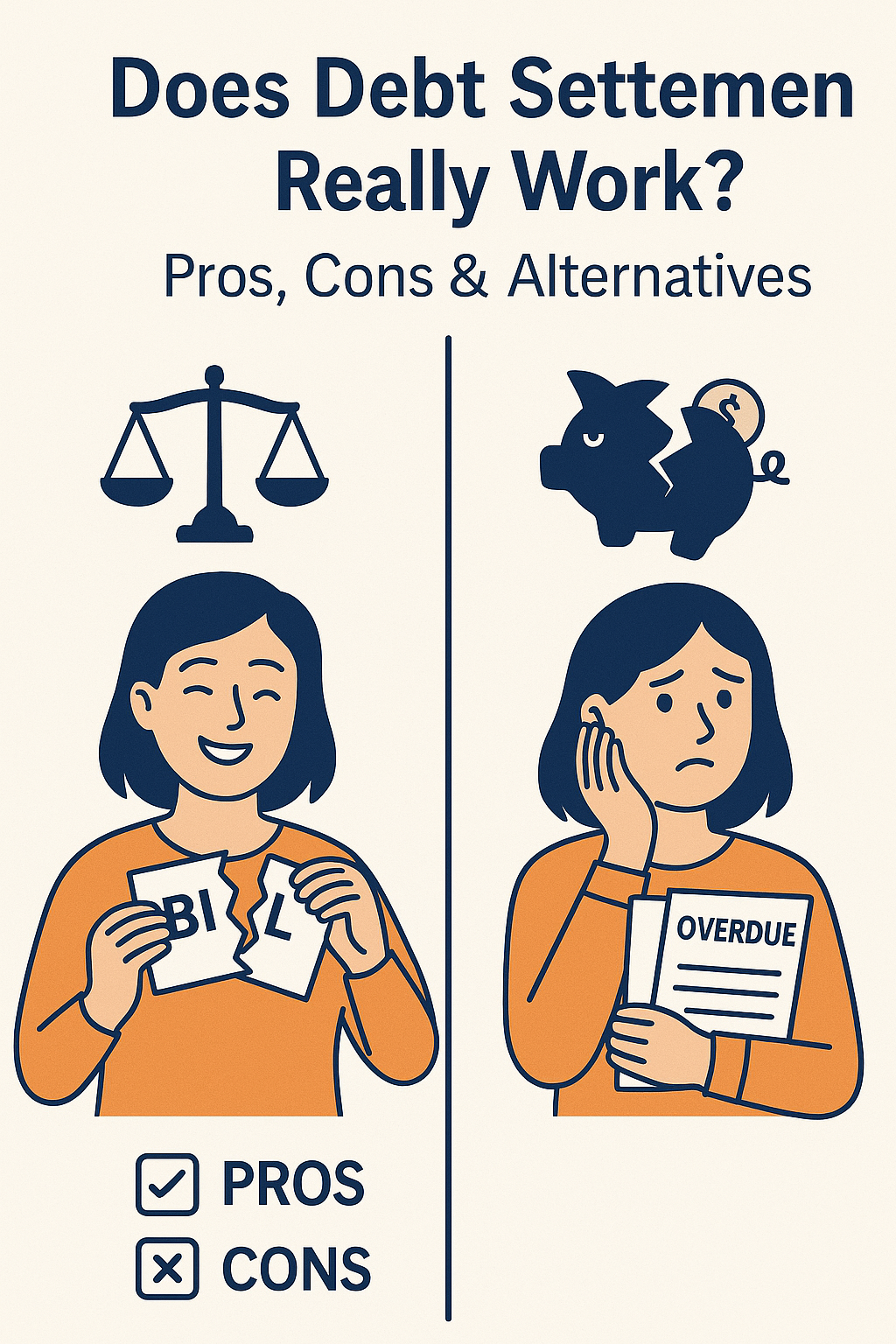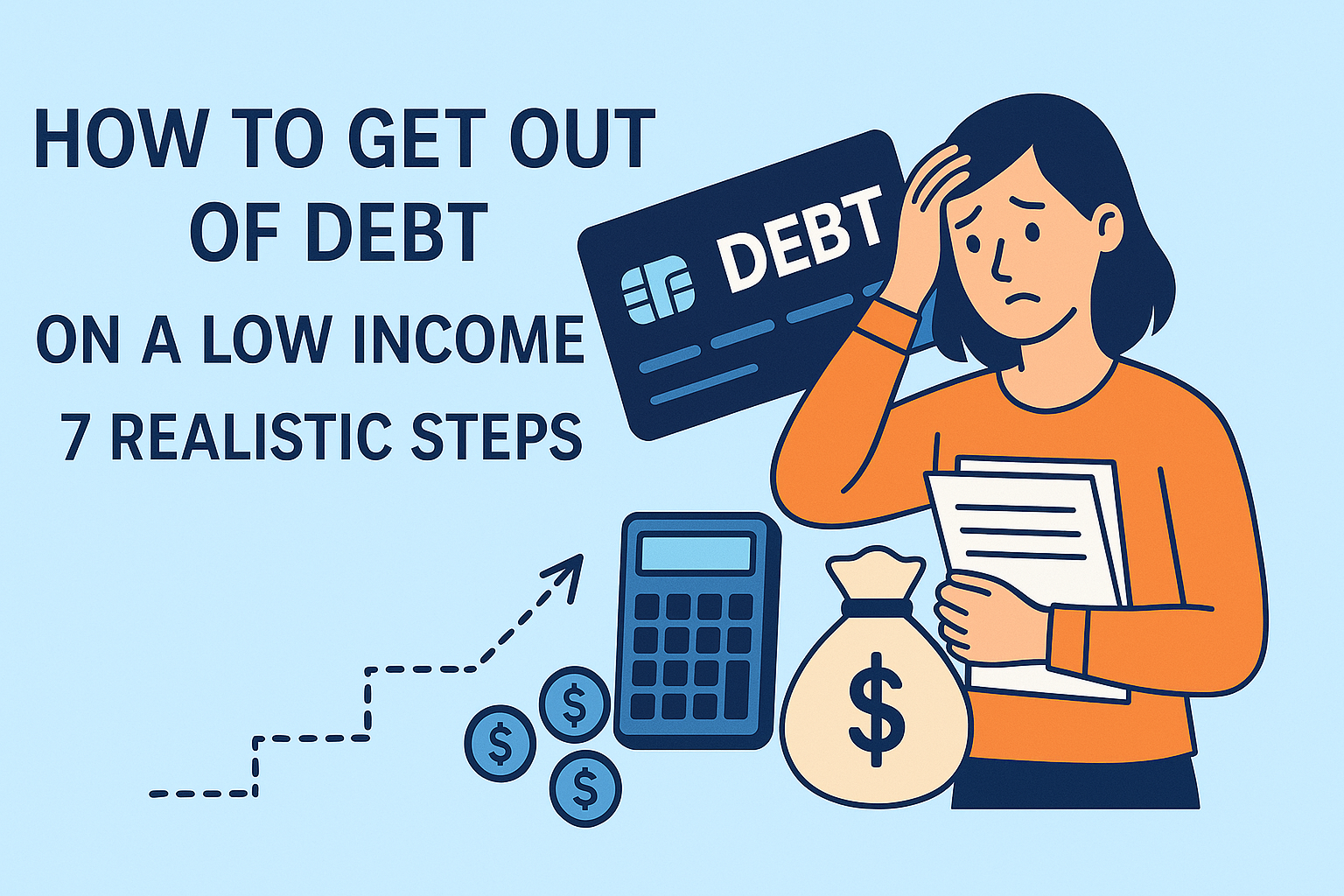Meta Description:
Wondering if debt settlement is the right solution for you? Discover how it works, the risks involved, and better alternatives for managing debt in the U.S.
💬 Thinking About Debt Settlement? Read This First
If you’re drowning in credit card debt or collection notices, debt settlement might sound like a lifeline. Who wouldn’t want to pay less than what they owe?
But before you jump in, it’s crucial to understand how debt settlement works in the U.S., what it really costs, and whether it’s the best move for your financial future.
💡 What Is Debt Settlement?
Debt settlement is when you or a company negotiate with creditors to let you pay a lump sum that’s less than the full amount owed—typically on unsecured debt like:
-
Credit cards
-
Medical bills
-
Personal loans
-
Collection accounts
Once the creditor agrees and you pay, the rest of the debt is legally forgiven.
✅ Pros of Debt Settlement
Debt settlement can be helpful—but only in specific cases. Here are the key benefits:
-
You pay less than you owe – This is the biggest draw. You might settle a $10,000 debt for $4,000–$6,000.
-
Avoid bankruptcy – It may feel like a last resort, but it’s less damaging than Chapter 7 or 13.
-
One-time resolution – Once settled and paid, the debt is gone for good.
-
Can reduce stress – It stops collections on settled accounts.
⚠️ Cons of Debt Settlement
Before choosing this route, be aware of the real costs and risks:
-
It hurts your credit – Accounts typically go 120+ days past due before settlement, severely impacting your score.
-
You may owe taxes – The IRS may treat the forgiven debt as taxable income.
-
No guarantees – Creditors don’t have to agree. And some won’t.
-
Fees can be high – Settlement companies often charge 15%–25% of the debt amount.
-
Scams are everywhere – Many “debt relief” companies make false promises and take upfront fees (which is illegal under FTC rules).
-
You could get sued – While saving up for a lump-sum payment, creditors can still take legal action.
🤔 So, Does It Really Work?
Debt settlement can work—but it’s not for everyone.
It may be an option if:
-
You’re seriously behind on payments
-
You have hardship circumstances (job loss, illness, etc.)
-
You can’t afford even minimum payments
-
You have a lump sum (or can save it quickly) to offer a settlement
It’s usually not a good choice if:
-
You have mostly secured debt (like car or home loans)
-
You’re current on payments (creditors are unlikely to settle)
-
You could pay off your debt in full with a payment plan
-
You’re considering a company that charges upfront fees
🔁 Better Alternatives to Debt Settlement
Here are safer and more credit-friendly options to consider:
1. Debt Management Plan (DMP)
-
Work with a non-profit credit counselor
-
Make one monthly payment through an agency
-
Get lower interest rates & fees
-
Doesn’t hurt your credit like settlement does
📌 Try: National Foundation for Credit Counseling (NFCC)
2. Debt Consolidation Loan
-
Combine multiple debts into one fixed monthly loan
-
Lower interest, easier to manage
-
Best for those with decent credit
3. Balance Transfer Card
-
0% APR for 12–21 months
-
Transfer high-interest credit card balances
-
Requires good to excellent credit
4. Negotiate Yourself
You can call creditors on your own and ask to:
-
Reduce interest rates
-
Waive late fees
-
Settle for less (just like a company would—but no fee!)
5. Bankruptcy (as a last resort)
-
Chapter 7 or Chapter 13
-
May wipe out most unsecured debt
-
Serious credit impact, but a clean slate
📊 Quick Comparison Table
| Option | Credit Impact | Cost | Best For |
|---|---|---|---|
| Debt Settlement | High | 15–25% fee + taxes | Large debt + financial hardship |
| Debt Management Plan | Moderate | $0–$50/month | People with steady income |
| Debt Consolidation Loan | Low–Moderate | Interest + fees | Good credit, multiple debts |
| Balance Transfer Card | Low | 0% APR (limited) | Excellent credit, short payoff window |
| Bankruptcy | Very High | Legal fees | Extreme financial distress |
✨ Final Thoughts: Choose What’s Right for You
Debt settlement isn’t a scam—but it’s also not a magic fix.
It can work if you’re in deep financial trouble, but it’s not your only choice.
Before making a decision:
-
Review your full financial picture
-
Speak to a non-profit credit counselor (they’re free!)
-
Understand the long-term effects on your credit and future loans
Debt is temporary—but your financial peace of mind is forever.





I?¦ve recently started a web site, the information you offer on this website has helped me tremendously. Thanks for all of your time & work.
I have not checked in here for some time since I thought it was getting boring, but the last several posts are great quality so I guess I?¦ll add you back to my daily bloglist. You deserve it my friend 🙂